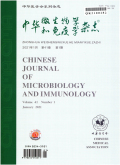摘要流感病毒严重危害人类健康,对社会发展造成重大影响,成为世界公共卫生安全隐患。因此,了解流感病毒的生命周期能够为抗病毒感染提供策略。感染病毒的宿主细胞会通过启动固有免疫系统来抵御病毒的入侵,而病毒与宿主因子的关系是密不可分的,在流感病毒生命周期中的各个阶段都需要宿主因子的参与并对流感病毒的增殖产生不同的效应。聚合酶碱性蛋白1(polymerase basic protein 1, PB1)为RNA聚合酶亚基,是流感病毒复制和转录过程中的关键病毒蛋白。本综述总结了不同的宿主因子与PB1发生相互作用,进而调节流感病毒的复制、传播与致病性,为抗病毒药物的研发提供新思路。
更多相关知识
abstractsInfluenza viruses are a serious threat to human health and have a major impact on social development, making them a public health and safety hazard worldwide. Therefore, understanding the life cycle of influenza viruses can provide strategies for fighting viral infections. After influenza virus infection, host cells will defend themselves against the virus by activating the innate immune system. There is a close relationship between the virus and host factors, as host factors are required at each stage of the influenza virus life cycle and have different effects on virral proliferation. Polymerase basic protein 1 (PB1), an RNA polymerase subunit, is a key viral protein in influenza virus replication and transcription. This review summarized how different host factors interact with PB1 to regulate the replication, transmission and pathogenicity of influenza viruses, providing new ideas for the development of antiviral drugs.
More相关知识
- 浏览74
- 被引0
- 下载0


相似文献
- 中文期刊
- 外文期刊
- 学位论文
- 会议论文



 换一批
换一批 换一批
换一批



